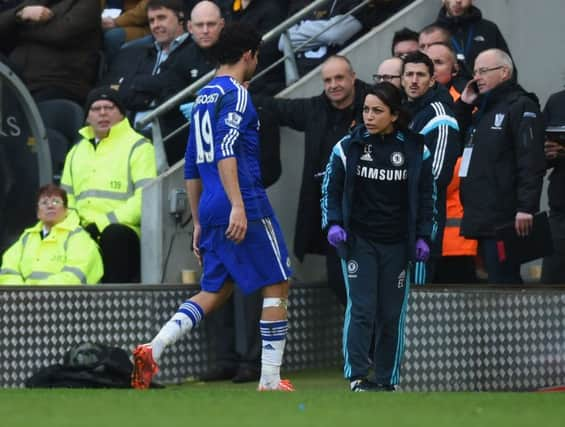Should Chelsea doctor Eva Carneiro get a lawyer?


The reports that Chelsea Football Club’s team doctor Eva Carneiro was to have her role “significantly changed” after criticism from boss Jose Mourinho raises interesting ethical and legal questions about the tension that can exist between acceptable performance and expert professional judgment.
Dr Carneiro was accused of being “impulsive and naive” by Mourinho and failing to “understand the game” when she rushed to assist player Eden Hazard following a fall during the first home Premier League game of the season, against Swansea, which then ended in a draw. In that situation, the player must leave the pitch, but the team were already down to ten men, having had their goalkeeper sent off earlier in the game.
Advertisement
Hide AdAdvertisement
Hide AdEva Carneiro has been with the club for six years, so she must have been aware how her intervention would impact at that critical moment. She will remain as team doctor but reports suggest she will no longer attend matches or training sessions. Some commentators have suggested that Mourinho’s reaction may have been different had Dr Carneiro been a man, raising further questions about his attitude toward gender and sex discrimination. Others point to the fact that the club physiotherapist Jon Fearn didn’t exactly come away unscathed either. However you look at it, the doctor’s decision to check on the player turned out to be a pill too bitter for the mercurial Mourinho to swallow.
Where do you draw the line when allowing a key employee to exercise their professional judgment and should the bigger picture always take priority? Would it, for example, have been obvious that the injury wasn’t more serious and can a medical professional ever be expected to take that risk? If an injured player had been allowed to continue, exacerbating the injury, resulting in loss of earnings (and what earnings!), they could have sued the doctor and the club.
The Football Medical Association made its support for its member unequivocal, stating that where a referee agrees a player may be injured and needs assessment, “at that moment the player becomes a patient of the medical team and it is the duty and obligation of club medical staff to attend to that patient without prejudice to the interests of anyone else including the club employing them… and factors extraneous to the immediate medical needs (such as the stage and the state of the game) cannot be a consideration”.
Guidelines by the General Medical Council (GMC) similarly make clear that a doctor must make the care of their patient “their first concern”.
Such judgments have to be made daily in many occupations, but in this case the difference was the public spotlight and very significant commercial considerations. Operating in this strange bubble, it appears that some football managers think themselves above the law and common sense.
If the reports are correct, would exclusion from matches and training sessions amount to a breach of the implied term of trust and confidence? I would have thought so. Is the reality going to be the employee is so well paid she will overlook being left off the bench for the foreseeable future? Who knows, but beyond thanking people on Twitter for the outpouring of public support, Dr Carneiro has maintained a face of quiet, professional dignity.
Contrast Mourinho’s very public criticism of his employee and that further reinforces the argument that the club has acted in a way that is very likely to undermine her trust and confidence in her employer, a key implied term in every employment contract which, if breached, would found a claim for constructive, unfair dismissal.
This is a dilemma many of us will recognise in different forms. It reminds us that if an expert is being brought in, they should be allowed to exercise their judgment, especially on something as important as employee welfare. After all, that’s why they are there.
Advertisement
Hide AdAdvertisement
Hide AdOne might draw an analogy with a lecturer’s right to academic freedom of expression in education or a safety manager’s call to close what they consider to be an unsafe building despite the potential loss of revenue to the business it accommodates. As an employer, if you compromise the work of an employee in this situation, you risk significant claims, not only in the Employment Tribunal but also in the civil courts.
• Chris Phillips is an Employment Law Partner with Simpson & Marwick www.simpmar.com